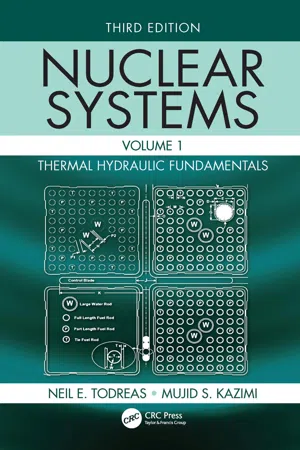
Nuclear Systems Volume I
Thermal Hydraulic Fundamentals, Third Edition
- 900 pages
- English
- ePUB (mobile friendly)
- Available on iOS & Android
Nuclear Systems Volume I
Thermal Hydraulic Fundamentals, Third Edition
About this book
Nuclear Systems, Volume I: Thermal Hydraulic Fundamentals, Third Edition, provides an in-depth introduction to nuclear power, focusing on thermal hydraulic design and analysis of the nuclear core and other key nuclear plant components. The authors stress the integration of fluid flow and heat transfer as applied to all power reactor types and energy source distribution. They cover nuclear reactor concepts and systems, including GEN III+, GEN IV, and SMR reactors and new power cycles. The text includes new chapter examples and problems using concept parameters, full-color text and art, computer programs, figure slides, and a solutions manual.
FEATURES
- Rigorous coverage of nuclear power generation fundamentals
- Description and analysis of the latest nuclear power plant designs and technologies
- Extensive examples in each chapter to illustrate the analysis methods which have been presented
- New full-color art and text features to enhance the presentation of topics
- Integration of fluid flow and heat transfer as applied to single- and two-phase coolants
Readers will develop the knowledge and design skills needed to improve the next generation of nuclear reactors.
Frequently asked questions
- Essential is ideal for learners and professionals who enjoy exploring a wide range of subjects. Access the Essential Library with 800,000+ trusted titles and best-sellers across business, personal growth, and the humanities. Includes unlimited reading time and Standard Read Aloud voice.
- Complete: Perfect for advanced learners and researchers needing full, unrestricted access. Unlock 1.4M+ books across hundreds of subjects, including academic and specialized titles. The Complete Plan also includes advanced features like Premium Read Aloud and Research Assistant.
Please note we cannot support devices running on iOS 13 and Android 7 or earlier. Learn more about using the app.
Information
1 Principal Characteristics of Power Reactors
1.1 Introduction
Reactor Type | Neutron Spectrum | Moderator | Coolant | Fuel | |
|---|---|---|---|---|---|
Chemical Form | Approximate Fissile Content (All 235U Except the Sodium-Cooled Reactors) | ||||
Water-cooled | Thermal | ||||
PWR | H2O | H2O | UO2 | 3... | |
Table of contents
- Cover
- Half Title
- Title Page
- Copyright Page
- Dedication
- Table of Contents
- Preface to the Third Edition
- Preface to the First Edition
- Acknowledgments
- Authors
- Chapter 1 Principal Characteristics of Power Reactors
- Chapter 2 Thermal Design Principles and Application
- Chapter 3 Reactor Energy Distribution
- Chapter 4 Transport Equations for Single-Phase Flow
- Chapter 5 Transport Equations for Two-Phase Flow
- Chapter 6 Thermodynamics of Nuclear Energy Conversion Systems—Nonflow and Steady Flow: Applications of the First and Second Law of Thermodynamics
- Chapter 7 Thermodynamics of Nuclear Energy Conversion Systems—Nonsteady Flow First Law Analysis
- Chapter 8 Thermal Analysis of Fuel Elements
- Chapter 9 Single-Phase Fluid Mechanics
- Chapter 10 Single-Phase Heat Transfer
- Chapter 11 Two-Phase Flow Dynamics
- Chapter 12 Pool Boiling
- Chapter 13 Flow Boiling
- Chapter 14 Single Heated Channel: Steady-State Analysis
- Appendix A: Selected Nomenclature
- Appendix B: Physical and Mathematical Constants
- Appendix C: Unit Systems
- Appendix D: Mathematical Tables
- Appendix E: Thermodynamic Properties
- Appendix F: Thermophysical Properties of Some Substances
- Appendix G: Dimensionless Groups of Fluid Mechanics and Heat Transfer
- Appendix H: Multiplying Prefixes
- Appendix I: List of Elements
- Appendix J: Square and Hexagonal Rod Array Dimensions
- Appendix K: Parameters for Typical BWR-5 and PWR Reactors
- Appendix L: Acronyms and Abbreviations
- Index